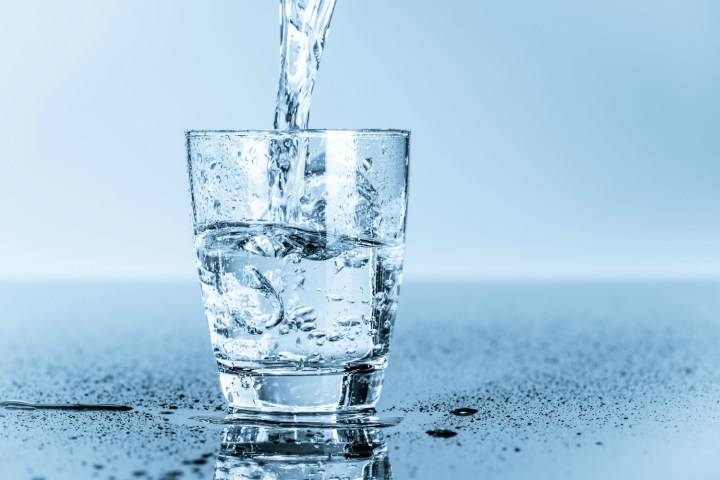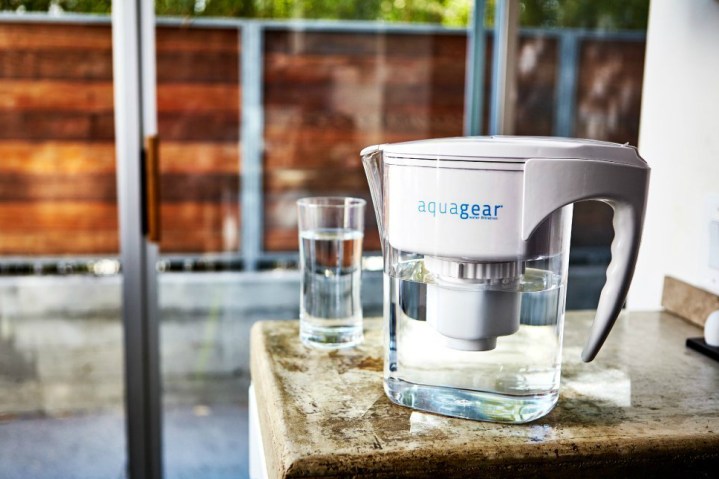
Not all filters do the same tasks. Some are just meant to get rid of contaminants that affect the taste of your water, while others tackle more serious concerns, like lead. NSF International can help determine if your filter actually removes lead. Here are some of the best home water filtration systems on the market today.
The never-forget-your-filter option: Brita’s Infinity Pitcher ($45)

While the Brita Infinity Pitcher reduces contaminants such as copper, cadmium, and chlorine in your tap water, that’s not the reason why this filtration system is included on our list. The Brita Infinity earned its spot due to its automatic ordering system.
This water pitcher can be connected to Amazon’s Dash Replenishment system to automatically order replacement filters when you’re running low. The pitcher has built-in Wi-Fi capabilities and a tracking system that measures how much water it has filtered. The Brita Infinity will last for about 40 gallons until it needs a new filter. When it does, the pitcher notifies Amazon Dash Replenishment and a new filter (about $6) will be sent to your home.
Read more about Brita’s Infinity Pitcher
The basic option: Pur LED Pitcher ($26)

Water filtration pitchers may not give you the same purity levels as a reverse osmosis device, but they are perfectly suitable for most households. If you’re just looking for a simpler water filter pitcher to remove basic contaminants and provide healthy water for your family, you can’t go wrong with one of the many options from Pur. Our favorite is the Pur LED Pitcher. This filter in this water pitcher will last for about 40 gallons. This pitcher can’t automatically order a new filter like the Brita Infinity, but it does have an LED filter life indicator light which alerts you when it’s time to order a new one.
The fluoride-free option: Aquagear Water Filter Pitcher ($70)

Some people are looking for a water filter that will remove fluoride (though your teeth may not thank you), and the AquaGear pitcher does that, but it also has a lot of other features that come with a high price tag. The pitcher meets NSF standards 42 and 53, and the company says it removes chlorine to improve taste, as well lead. Each filter lasts for 150 gallons, so you won’t have to change it as often. AquaGear will also recycle the used filters if you return them and for each purchase provides someone in need with six months of clean drinking water through Thirst Relief International.
The faucet option: Pur Advanced Faucet Filter ($25)

Faucet filters are a great option for on-demand pure water. These devices are relatively easy to install and typically provide better filtration than their pitcher-system cousins. The Pur Faucet Filter installs with one simple click and will last for about 100 gallons (about three months of use). Of course, you don’t have to keep track, as the indicator light will let you know when the filter’s nearly dead. As far as filtration goes, Pur boasts that its filter removes 70 contaminants, including 99% of lead and 92% of pesticides. That’s a step up from the pitcher system, but if you’re trying to get the purest water you can possibly get, you should probably install an under-counter filtration system.
The serious option: iSpring Reverse Osmosis Drinking Water Filter System ($179)

Under-counter filtration systems can be a hassle to install (you may even need to hire a plumber), but they can provide water that’s free of harmful contaminants in areas where that’s a concern. The NSF-certified iSpring 5-Stage Reverse Osmosis Drinking Water Filter System is an entry-level, under-counter filtration purifier that removes up to 99% of contaminants, including arsenic, chlorine, lead, and fluoride. The filtration system has several filters that need to be replaced, some every six months, others every few years. Like other reverse osmosis systems, this tank does waste some water as it’s purifying, so keep that in mind if you’re concerned about conserving H2O.


